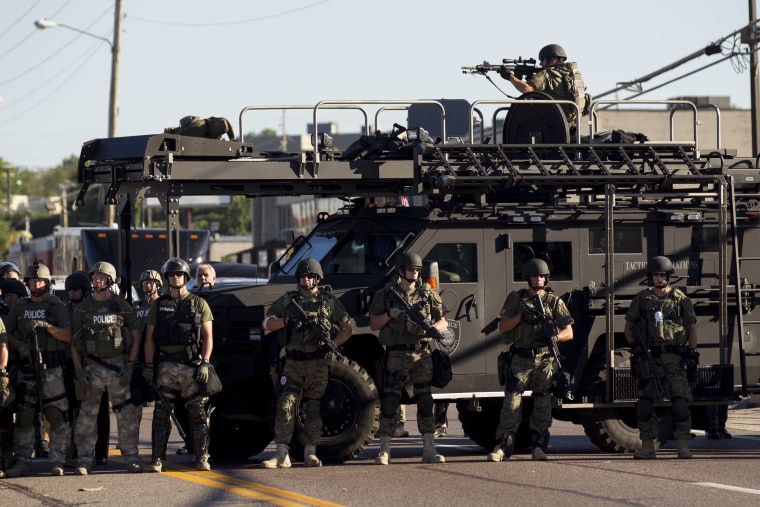When violence erupted in Ferguson, Missouri, last year, it was a multi-faceted crisis, but one of the details many Americans found surprising was the militarization of local law enforcement. As the unrest grew more serious, we saw images of police officers relying on weapons of war when confronting civilians.
And for a brief while, it seemed like action on the issue was at least possible. As we
talked about at the time, Sen. Claire McCaskill (D-Mo.) chaired a Senate hearing in September on police militarization, and even some Republicans endorsed reforms to the Pentagon's "1033" program. In the House, Rep. Hank Johnson (D-Ga.) drafted legislation.
But as is often the case, Congress' attention span was limited; the Ebola virus began to dominate the political world's attention; and police groups
lobbied lawmakers to back off. The debate effectively vanished.
The White House, however, did not forget about the issue, and as msnbc's Trymaine Lee
reports, President Obama will unveil today "a ban on the transfer of some types of military weapons to local police departments."
The ban is part of a broader effort by the Obama administration to ease tensions between police and communities of color across the country, including Ferguson and Baltimore, theaters of unrest following the deaths of unarmed black men killed by police. [...] The new restrictions are being rolled out as a policing task force. A 116-page report will urge the country's police agencies to "embrace a guardian -- rather than a warrior-- mindset to build trust and legitimacy both within agencies and with the public."
According to White House materials released this morning, the banned items include armored vehicles, grenade launchers, and .50-caliber ammunition. As NBC News'
report added that if local police departments "want other, less-imposing military equipment, local law enforcement agencies will have to submit to stringent federal oversight and restrictions."
The msnbc
report added that proponents of criminal-justice reforms are encouraged, and see this as an important step, but it's not the end of the controversy.
Dante Barry, executive director of Million Hoodies Movement for Justice, said the president's militarization ban is a good first step, but arriving at this moment has been long a coming. "If not for all the pressure that groups like ours and all the folks that were on the ground in Ferguson we would not have gotten to this point," Berry told msnbc. "This is just a stepping stone. I think we want to get away from this idea that the military equipment is the only form of police militarization, it's not." Berry said there needs to be more oversight and accountability of local police SWAT teams that routinely raid black and brown communities and more transparency when it comes to surveillance technology used to spy on Americans.
As for Capitol Hill, nearly everyone involved in the debate assumes Congress will do nothing on the issue in this session.
Update: It's worth noting that while congressional action is unlikely given GOP control, Sen. Claire McCaskill's (D-Mo.) interest in the issue, to her credit, has not waned. The Missouri senator
introduced new legislation on the issue just two weeks ago.
